Ranking the Golden Era Seasons of The Simpsons
Photos via Frinkiac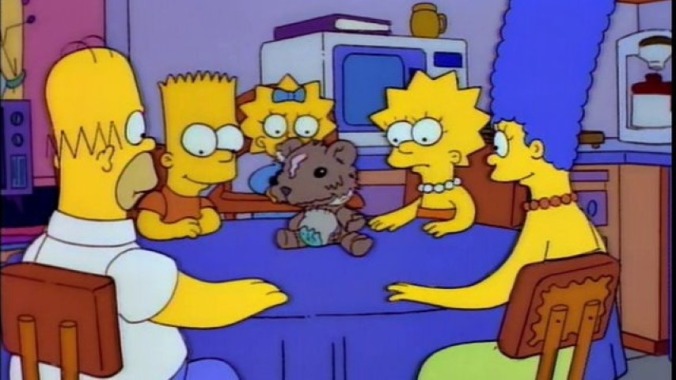
Ranking the seasons that make up the so-called golden era of The Simpsons is a dire undertaking when it comes to potentially upending the collective groupthink that has coalesced over decades around the legacy of one of the most beloved TV comedies of all time. When it comes to The Simpsons, fans have strongly ingrained opinions born from endless rewatching of the show’s strongest era, even while the franchise itself continues its undead shamble into an about-to-premiere 36th season on Fox, which will be its 769th episode.
Suffice to say, there are clearly viewers out there somewhere who are still watching new seasons of The Simpsons with regularity, people who could tell the rest of us what exactly has been happening with Springfield’s first family for the last … oh, 25 years or so. But it often feels like there’s a much bigger segment of Simpsons devotees on the internet who continue to solely cherish the golden era, a meme-driven world where even a seemingly tiny niche like YouTube Simpsons shitposters can become a self-sustaining artistic community of incredible depth and creativity. This list is for the likes of them.
But of course, if you’re going to mention a phrase like “Simpsons golden era,” you’re inviting inevitable, frenzied discussion of what constitutes that era in the first place. There are Simpsons fans who quite rigidly exclude the first season (and even the second) of the show from this conversation entirely, or who place the end of the golden era as early as “Who Shot Mr. Burns?” Those hard-liners are opposed just as often by apologists who will argue that the show was still pumping out plenty of quality episodes all the well into its double digit seasons, or those who still place a glaring red “X” on Season 9’s infamous “The Principal and the Pauper” as the point of no return.
For my part as a lifelong Simpsons fan, I take a somewhat moderate approach. I believe that the show’s decline in quality is starkly visible in seasons 9 and 10, but that it can be seen to begin more subtly in the two seasons preceding those. I recognize that the show as it existed in seasons 1 and 2 was by no means the same as the show it became, and can be difficult to directly compare as a result. But roughly, I believe that all of the span between seasons 1 and 10 belong on a list like this one, because there’s value in discussing both the show’s odd beginnings and the symptoms of its early decline. The “golden era” for me includes both the shaky first steps of a classic getting its feet under it, and the first wobbles of it losing its footing.
So with that said, let’s dive into ranking The Simpsons seasons 1 through 10, from worst to best.
10. Season 1
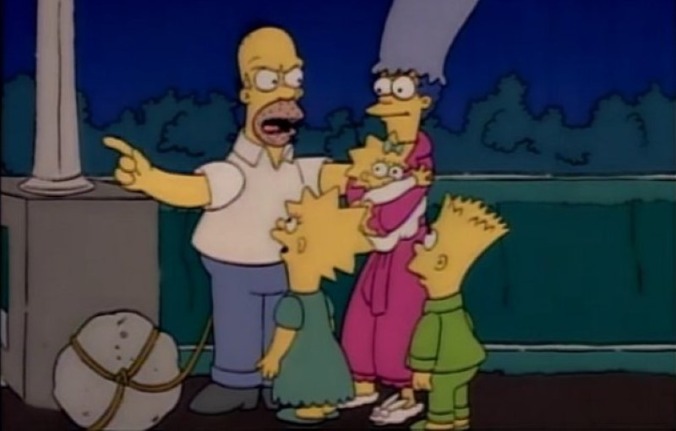
The task of comparing seasons 1 and 10 makes for a surprisingly difficult decision, because it’s such a stark duality. A viewer’s choice of which of these two seasons is superior is almost made less by the content of the episodes, and more by what you value in Simpsons episodes … or by what rubs you the wrong way. What’s the bigger problem–the incomplete characterization, nonstandardized drawing and sometimes grating sincerity of season 1, or the increasingly tired, loud zaniness of season 10?
At the end of the day, I favor the episodes with significantly better jokes, which means that last place in our ranking is the inaugural season of The Simpsons. This is the show at its most saccharine, before it had really started sharpening its satirical barbs in a way that would still resonate with modern viewers. Viewers of the time might have found elements of The Simpsons risque in its infancy, but in this moment the nearest cultural touchstone or comparison is still something like old reruns of The Flintstones or The Jetsons. A slightly more cynical, animated take on middle class American suburban family life felt like a great novelty at the time, but The Simpsons would rapidly evolve to push the boundaries with far more incisive observations and snappier jokes in short order.
Going back to watch season 1 episodes today, it’s the characters who feel particularly flat and two-dimensional, and simultaneously foreign to the beloved characters they would become within a few years. Look at the self-seriousness and lack of jokes in an episode like “Homer’s Odyssey,” which sees him with absolute earnestness planning his own suicide by drowning after losing his job at the power plant, only to become a safety crusader around Springfield instead. Absolutely absent is the shield of good-natured obliviousness that would have prevented Homer from attempting such a thing in later seasons, or the inherent self-centeredness that would have made the second part of his arc here hard to accept. This Homer, the scion of dozens of caring sitcom dads before him, just isn’t the kook who would go on to become the show’s breakout character. Not yet.
9. Season 10
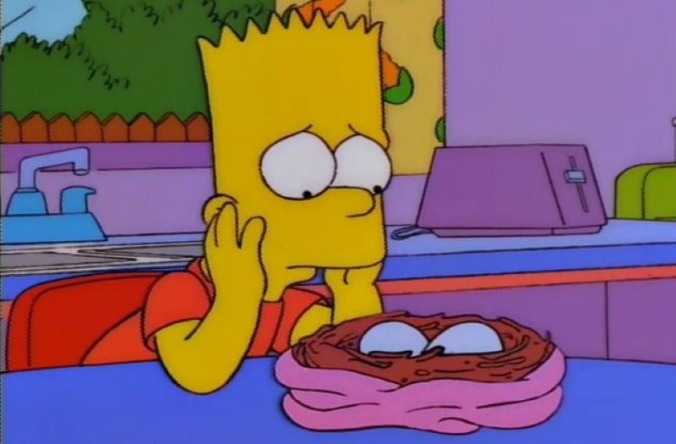
When you look back at the golden era of The Simpsons, it’s easy to forget how rigorously the show was being assessed and graded by contemporary TV critics in its heyday, many of whom seemed to be engaged in a pitched competition to be the first to definitively proclaim that it had jumped the shark. This led to some false starts in terms of confirming that the show had begun a downward descent, but by the time season 10 arrived, many of those critical voices had coalesced into agreement: The problems that were beginning to appear could no longer be ignored.
Thing is–and this is true of seasons 11 and 12 to a lesser extent–there’s still great stuff here. There are individual episodes in season 10 that would fit in perfectly well in earlier seasons, such as Bart’s moral moment in “Bart the Mother,” Lisa’s fall from grace in “Lisa Gets an A,” or Homer’s absurd grease-collection racket in “Lard of the Dance.” But for the first time in the series’ history, the good is arguably outweighed by episodes that feel like they’re trying too hard, grasping for relevance and laughs that used to come much more easily.
Some of the series’ worst modern habits begin to be enshrined here, such as episodes that revolve too inextricably around celebrity guests, as in “When You Dish Upon a Star,” or trite anthologies in the mold of “Simpsons Bible Stories,” a format that would be abused in years to come as an excuse to cram Simpsons characters into random parodies of literature, movies, etc. What had been an occasional, yearly indulgence in the likes of Treehouse of Horror episodes steadily became a lazy fallback option for whenever the creative tanks were getting close to empty. This season just gets less mileage out of some of the same ideas that the series had done so memorably, like throwing yet another new job at Homer. In this season alone, he has stints as a truck driver, celebrity assistant, inventor, hippie, bodyguard, spring salesman and pop artist! It’s all just too much.
8. Season 9
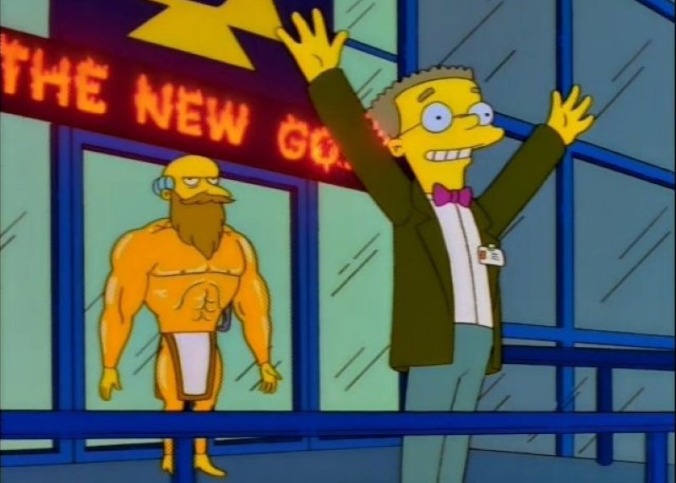
Many moderate sorts of Simpsons fans will peg season 9 as the end of the show’s golden era, although it raises a question of whether it’s to be included or eschewed in that era. I would certainly favor inclusion, and I think this season is pretty dramatically better than season 10, with a significantly higher rate of great episodes and only a handful of outright duds. Still: This is indeed the season where a savvy contemporary viewer might have found themselves wondering if the show’s best days were behind it.
The elephant in the room is likely “The Principal and the Pauper,” undoubtedly the most commonly cited moment for The Simpsons to have theoretically jumped the shark. Audiences simply felt betrayed on some level by its “Principal Skinner is an imposter” storyline, wondering why there had been so much character development over the years to now spring this kind of character-redefining reveal out of nowhere, and then drop it all at the end of the episode, never to be mentioned again. It just wasn’t the kind of decision the series would have made if it still had the same wealth of creativity that it possessed a couple years earlier. Other weak moments of the season include the likes of “Bart Carny,” the patently unnecessary musical clip show “All Singing, All Dancing,” and the entirety of the Moe-centric “Dumbbell Indemnity,” which feels like someone took “The Love-matic Grampa” segment of season 8’s “Simpsons Spin-Off Showcase” and just extended it to episode length.
Season 9’s highlights, thankfully, are quite high indeed. “The City of New York vs. Homer Simpson” is one of the best travel-related episodes the series ever did, despite becoming infamous for its segments with the World Trade Center. “The Joy of Sect” has some marvelous satire of organized religion and pop psychology, not to mention joyous references to 1960s British psychological thriller The Prisoner. The gun fetishization of “The Cartridge Family” rings more sadly true today than ever. Even “This Little Wiggy” manages the tricky proposition of giving some depth to Ralph Wiggum, echoing season 4’s “I Love Lisa.” All in all, season 9 may well be better than some remember it being.
7. Season 2
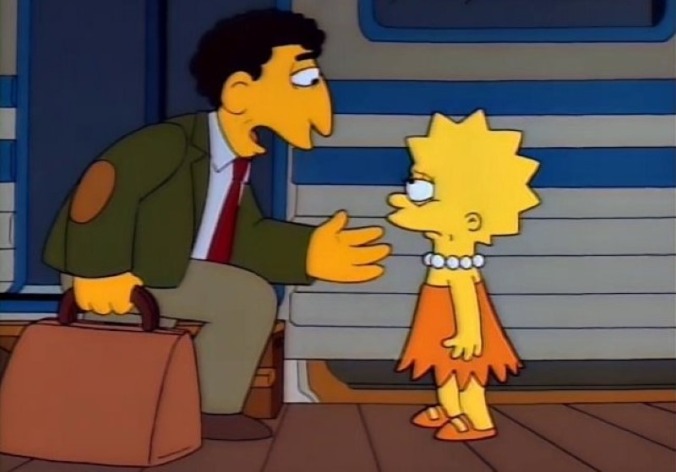
The second season of The Simpsons is arguably another one of the most difficult to rank. The frankness and sincerity of the first season of the show hasn’t entirely worn off just yet, but it has been refined substantially, making its more earnest moments feel more earned and organic, though it does suffer from an awful lot of “apologize and make up” sitcom moments. The characters feel far more like themselves as well–the Homer seen in “Homer vs. Lisa and the 8th Commandment” feels much more true to his cheerfully unscrupulous nature than anything seen in season one. Specific supporting characters such as Mr. Burns begin to take on significantly greater stature as well, especially in episodes like “Two Cars in Every Garage and Three Eyes on Every Fish,” “Bart Gets Hit by a Car” and “Blood Feud.”
Season 2 gives us our schmaltzy original canon origin story for the relationship of Marge and Homer in “The Way We Was,” material that has been sadly and confusingly retconned a few times since as the series has attempted to stay relevant and current. It also has some material that hasn’t aged particularly well thanks to intense sentimentality, like the Homer-Grampa relationship seen throughout “Old Money,” which is revisited more effectively in an episode like season six’s “Grampa vs. Sexual Inadequacy.”
Season highlights include the tear-jerking “Lisa’s Substitute” and deeply influential “Bart the Daredevil,” with Homer’s iconic plunge into Springfield Gorge. I’m also partial to “Brush With Greatness” for Ringo Starr’s gregarious cameo, and Mr. Burns’ explanation that “I’m no art critic, but I know what I hate … and I don’t hate this.”
6. Season 8
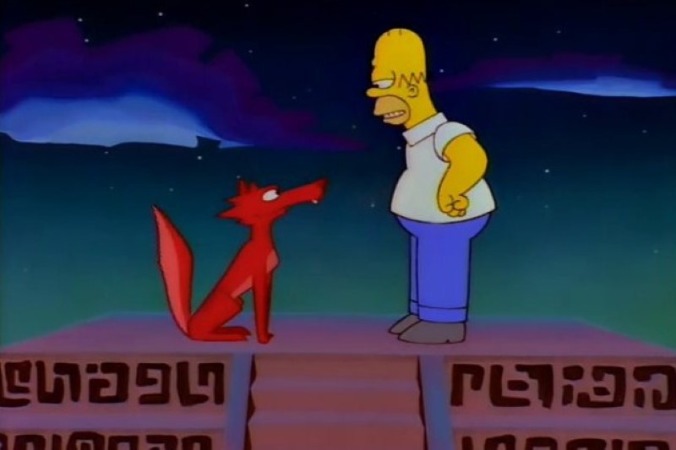
Episodes in the golden era of The Simpsons never hesitated in lampooning the show’s own longevity and perceived declining momentum, blissfully unaware that it would somehow still be on the air almost three decades later. Take it from Kent Brockman in Season 8’s “The Itchy & Scratchy & Poochie Show”: “For years, TV critics such as yours truly have waited impatiently for cracks to appear in the show’s hilarious facade.” It’s an entire episode of The Simpsons dedicated to taking on its own outsized pop-cultural influence, with hilarious results and an entirely justified skewering of superfan entitlement. It’s indicative of the high level that the show was still operating at in season 8 … but with that said, this season is also the first time that the show begins to feel ever-so-slightly infected by the sense of malaise that would finally drag it back down to earth.
There aren’t even many “bad episodes” to point at specifically, but there are certainly portions. Take “The Twisted World of Marge Simpson,” which sets up a decent story about Marge running a homemade pretzel business, only to completely run out of steam in a throwaway ending that concludes without any of her imminent problems really being resolved. Or “Homer’s Phobia,” with its now quaint-feeling handling of the scandal of a single gay character coming into Homer’s sightline. The overall impression is just the slightest bit tired.
At the end of the day, though, this is also the point in this list where it becomes difficult to criticize any of these seasons as a whole. Season 8 is packed with plenty of other great stuff: “You Only Move Twice” shows us what life outside of Springfield might be like for the family while also featuring Albert Brooks’ greatest guest character in Hank Scorpio. “The Mysterious Voyage of Homer” dazzles with a Guatemalan insanity pepper-fueled descent into Homer’s madness that features some of the most impressive animation ever seen in this era of the show. “Homer vs. The Eighteenth Amendment” gives you the immortal John Swartzwelder line “To alcohol! The cause of, and solution to, all of life’s problems,” a phrase that has lived on in pop culture ever since. The rare Simpsons geek who claims that the golden era ends with “Who Shot Mr. Burns?” is missing out on a whole lot here.
5. Season 7
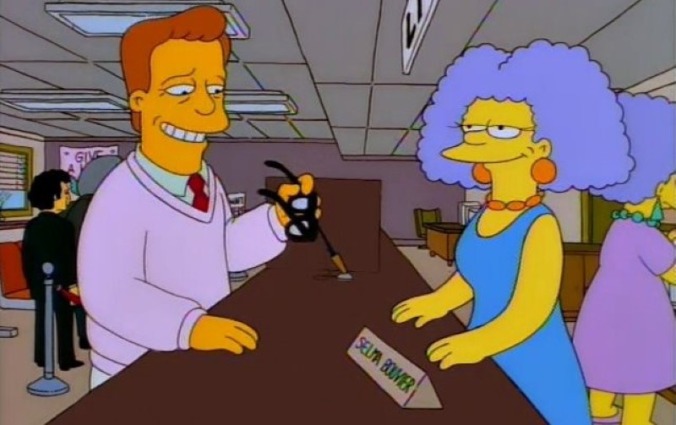
Season 7 feels very much of a kind with season 8 to me–fully mature Simpsons, perhaps a bit more given to cynicism and misanthropy than in the earlier golden era seasons, rattling off string after string of above average (at least) episodes. The batting average is very high.
Low points? There aren’t many, although “Sideshow Bob’s Last Gleaming” is probably the weakest of all the Bob-starring outings of the golden era, behind even the later “Brother From Another Series.” I think perhaps it’s the air show setting, which feels a bit more contained and limited than the varied locations of say, “Cape Feare.” “Mother Simpson” also isn’t a particularly strong episode, although it ends with one of the most genuinely affecting Simpsons moments ever as Homer sits alone on his car, silently contemplating the night sky over the end credits. It’s nice to see the introspective side of Homer that is typically hidden beneath his own bluntness.
High points include Moe’s disastrous attempt at establishing a family restaurant in “Bart Sells His Soul,” the Donald Sutherland-starring museum curator cameo of “Lisa the Iconoclast,” and the decision to base an entire episode around Troy McClure in “A Fish Called Selma,” giving Phil Hartman his finest hour on The Simpsons. Props also to “King-Size Homer,” “Homer the Smithers” and the entirety of “22 Short Films About Springfield,” whose Steamed Hams segment has become arguably the most memed Simpsons joke of all time.
4. Season 3
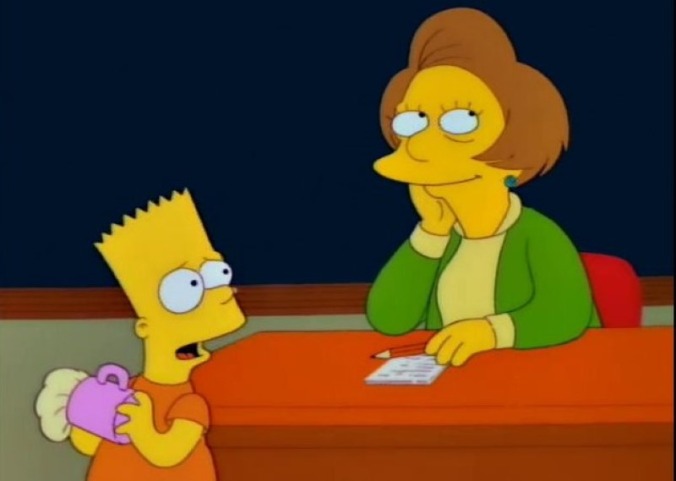
Now we’re getting into the seriously difficult decisions. It feels like I could arrange these last four seasons in pretty much any order and defend the choices without much difficulty. They represent the center slice of the creative peak of TV’s greatest animated sitcom.
Most any Simpsons fan would agree that season 3 is when the show really hits its full stride for the first time. It retains a little bit of the earnestness of the earlier seasons–see something like the faith-in-government conclusion of “Mr. Lisa Goes to Washington”–but has also developed a more cynical, bitingly satirical edge. The season builds momentum and gets stronger as it goes, with particularly brilliant outings in “Homer Alone,” “Radio Bart” and “Homer at the Bat,” which was an important episode for the show’s history, being one of the first to cobble a large assortment of guest star voices together with surprisingly great results.
If you’re going to use a single episode to demonstrate The Simpsons reaching maturity, though, make it “Bart the Lover,” which manages to deeply humanize Edna Krabappel via romantic misadventure, all while somehow keeping Bart’s meddling from coming off as too deliberately cruel. It’s a feat that the writers can have Bart mess with the poor woman’s life as much as he does here and still nail an ending that allows the little scamp to save face and demonstrate that he also has a heart. It’s a beautiful ode to both loneliness and ultimately self-affirmation.
3. Season 5

Season 5 of The Simpsons catches the show having shed the last vestiges of its earlier period (which would have ended in season 4) and embracing a more modern, sometimes wackier aesthetic. No season before this point, for instance, would have dared to do an entire episode sending Homer to space as an NASA astronaut, as in “Deep Space Homer,” and I imagine that writers and producers may have felt some fear here that the show could be overextending itself into late stage sitcom mania, or the phenomenon that ironically came to be known under the title “Flanderization,” when the most prominent traits of characters become exaggerated to the point of excess. The Simpsons was protected, though, by the simple fact that the joke-writing was at the absolute top of its game here–sillier premises are emboldened and brought to life by the top-tier gag writing.
There are no low points to speak of, though if I’m pressed to find one I might cite “Lady Bouvier’s Lover,” which never really manages to make Marge’s mother into a particularly interesting character–perhaps a reason why she’s never prominently featured again. Series classics from the season, on the other hand, include the likes of Sideshow Bob’s finest hour in “Cape Feare,” Lisa’s valiant crusade against sexism in “Lisa vs. Malibu Stacy,” or Bart’s attempts to evade an unstoppable Principal Skinner in “The Boy Who Knew Too Much.”
There’s also a strong contender here for one of the best episodes in series history, in the form of “Rosebud,” which again deepens the character of Mr. Burns considerably and gives all the family members their own time to shine as well, even Maggie. Classic film geeks can’t help but be taken in by the detailed and hilariously in-depth Citizen Kane references peppered throughout, and for everyone else there’s Homer eating 64 slices of American cheese. Undoubtedly a perfect episode.
2. Season 4

Perusing through the episodes of The Simpsons season 4, it’s tough to find anything that doesn’t have “classic” status. “Marge in Chains,” maybe? Even in a case like that, though, where it’s an episode that doesn’t necessarily stand out among so many other great ones that surround it, the level of joke writing would make it a stand-out for any other animated show of the era–not to mention all of the seemingly prophetic jokes about the pandemic in its opening moments that would go on to be heavily repurposed and memed in the opening days of the COVID-19 pandemic.
It’s an incredibly strong lineup in season 4, with some of the best highlights being Homer’s embrace of a new spiritual philosophy in “Homer the Heretic,” the toe-tapping instant classic that is “Marge vs. The Monorail,” or another outstanding Phil Hartman guest spot in “Brother From the Same Parent,” playing Bart’s “bigger brother” Tom. The jokes flow freely, but there’s still some tactful sentimentality as well, as seen in the Homer-Lisa relationship that is central to “Lisa the Beauty Queen.”
Picking an absolute best-in-show is difficult, but it’s hard to eventually land on anything other than the iconic “Last Exit to Springfield,” which is the kind of episode that perfectly blends together the travails and aspirations of each member of the family, from the understandable schoolyard embarrassment of Lisa with her hideous braces, to the encroaching cartoonish supervillainy of Mr. Burns, who is the ultimate foil here. There are few things in the history of The Simpsons funnier than his Seussian reaction to the singing power plant workers, or the hilariously long-winded aside into Grampa’s onion-related fashion choices. Another strong contender for the series’ greatest episode.
1. Season 6
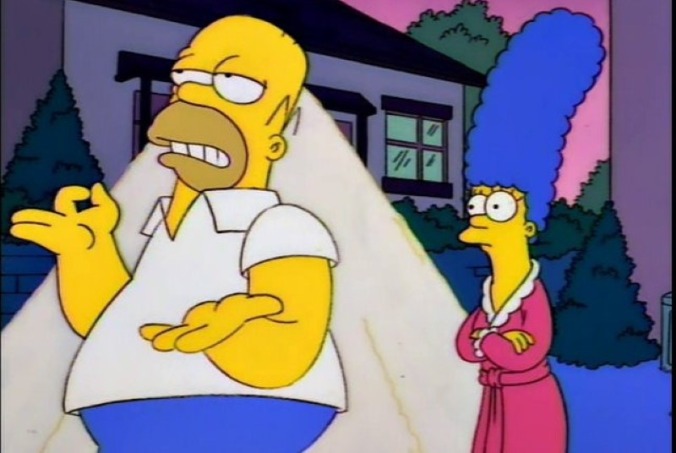
I wonder: Is this a contentious choice for the greatest season of The Simpsons, or a perfectly cromulent and defensible one? If someone was making an argument that the last two entries should be switched, I could certainly understand it: Season 4 might have a steadier level of average quality than season 6, with fewer peaks and valleys so to speak. But at the same time, I feel like the very best episodes of season 6 represent the utter apex of the series, with a handful that all are easily in the “greatest of all time” discussion. And at the end of the day, I feel like the season with the largest number of all-timer episodes probably deserves the title of “best season.”
As for low points, there’s very little to point out, besides the fact that I’ve never been particularly fond of “Lisa’s Wedding”–a common enough complaint about the handful of Simpsons episodes that try to portray the future, with middling success. This is far outweighed by oh-so-many episodes that are consistent laugh riots, including the likes of “Bart of Darkness,” “Homer Badman” or the pitch-perfect Westworld riff and corporate satire of “Itchy & Scratchy Land,” another one of the series’ best “The Simpsons go to _____” episodes. “Two Dozen and One Greyhounds” has some of Mr. Burns’ most magnetic villainy outside of “Rosebud,” while part one of “Who Shot Mr. Burns?” feels like a high water mark for the show’s legendary sense of joke density: The number of clever gags per minute have risen to heights that feel almost impossible to sustain.
The absolute best? Please, don’t make me choose between the blood feud of “Lisa on Ice,” the Shelbyville sojourn of “Lemon of Troy,” or Lisa being forced to confront inadequacy in “Lisa’s Rival.” The latter, though, contains what just might be the most perfect Simpsons moment of them all: Homer’s free-wheeling and deluded rant about guarding his 500-pound pile of ill-gotten sugar, endangered as it is by bees and smug British men who won’t hesitate to nick it the second he turns his back. This sequence, set to some of the most unique character animation ever employed by artists drawing Homer, distills The Simpsons at its absurdist peak. It remains as perfect today as when it aired just over 30 years ago, in 1994. Hopefully it will remain unblemished in the future wasteland of 2054, at a time when The Simpsons will hopefully be a fond memory, rather than still an anchor of FOX Sunday nights.
Jim Vorel is a Paste staff writer and resident genre geek. You can follow him on Twitter for more film and TV writing.






































